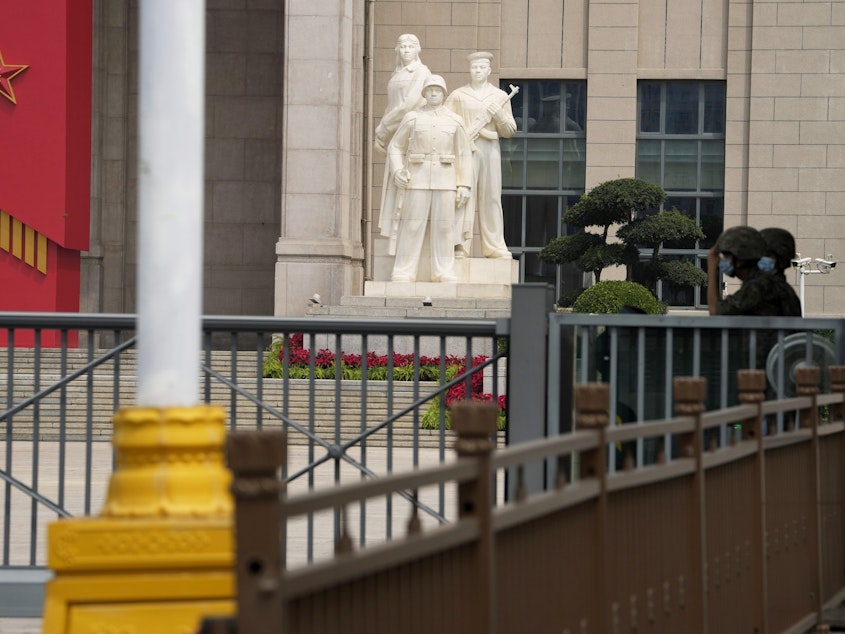China says it carried out precision missile strikes in the Taiwan Strait

KEELUNG, Taiwan — China says it conducted "precision missile strikes" in the Taiwan Strait on Thursday as part of military exercises that have raised tensions in the region to their highest level in decades.
China earlier announced that military exercises by its navy, air force and other departments were underway in six zones surrounding Taiwan, which Beijing claims as its own territory to be annexed by force if necessary.
The drills were prompted by a visit to the island by U.S. House Speaker Nancy Pelosi this week and are intended to advertise China's threat to attack the self-governing island republic. Along with its moves to isolate Taiwan diplomatically, China has long threatened military retaliation over moves by the island to solidify its de facto independence with the support of key allies including the U.S.
"Long-range armed live fire precision missile strikes were carried out on selected targets in the eastern area of the Taiwan Strait," the Eastern Theater Command of the People's Liberation Army, the ruling Communist Party's military wing, said in a statement on its social media platform.
"The expected outcome was achieved," it added. No other details were given.
Taiwan's Defense Ministry said it tracked the firing of Chinese Dongfeng series missiles beginning around 1:56 p.m. Thursday. It said in a statement it used various early warning surveillance systems to track the missile launches, which were directed at waters northeast and southwest of Taiwan.
The defense ministry also said they tracked long-distance rockets and ammunition firing in outlying islands in Matsu, Wuqiu and Dongyin.
Earlier during the day, Taiwan's Defense ministry said its forces were on alert and monitoring the situation, while seeking to avoid escalating tensions. Civil defense drills were held last week and notices were placed on designated air raid shelters months ago.
China's "irrational behavior" intends to alter the status quo and disrupt regional peace and stability, the ministry said.
"The three service branches will combine efforts with all the people to jointly safeguard national security and territorial integrity" while adapting to the situation as it develops, the statement said.
China's official Xinhua News Agency reported the exercises were joint operations focused on "blockade, sea target assault, strike on ground targets, and airspace control."
Ma Chen-kun, a professor at Taiwan's National Defense University, said the drills were aimed at showing off the Chinese military's ability to deploy precision weapons to cut off Taiwan's links with the outside and facilitate the landing of troops.
The announced drills are "more complete, and if the People's Liberation Army actually invades Taiwan in an all-out invasion, the concrete actions it will take, it's all in this particular exercise," Ma said.
"The main thing is they will cut off Taiwan's links to the outside world, from their sea, they would suppress the coastal defense firepower," he said.
Meanwhile, the mood in Taiwan was calm.
In Keelung, a city on the northern coast of Taiwan and close to two of the announced drill areas, swimmers took their morning laps in a natural pool built in the ocean.
Lu Chuan-hsiong, 63, was enjoying his morning swim, saying he wasn't worried. "Because Taiwanese and Chinese, we're all one family. There's a lot of mainlanders here, too," he said.
"Everyone should want money, not bullets," he quipped, saying the economy wasn't doing so well.
Those who have to work on the ocean were more concerned. Fishermen are likely to be the most affected by the drills, which cover six different areas surrounding Taiwan, part of which come into the island's territorial waters.
Most fishermen will continue to try to fish, as it is the season for squid.
"It's very close. This will definitely impact us, but if they want to do this, what can we do? We can just avoid that area," said Chou Ting-tai, who owns a fishing vessel.
While the U.S. has not said it would intervene, it has bases and forward-deployed assets in the area, including aircraft carrier battle groups.
On Thursday, the U.S. Navy said its USS Ronald Reagan aircraft carrier was operating in the Philippine Sea, east of Taiwan, as part of "normal scheduled operations."
U.S. law requires the government to treat threats to Taiwan, including blockades, as matters of "grave concern."
The drills are due to run from Thursday to Sunday and include missile strikes on targets in the seas north and south of the island in an echo of the last major Chinese military drills aimed at intimidating Taiwan's leaders and voters held in 1995 and 1996.
While China has given no word on numbers of troops and military assets involved, the exercises appear to be the largest held near Taiwan in geographical terms.
The exercises involved troops from the navy, air force, rocket force, strategic support force and logistic support force, Xinhua reported. [Copyright 2022 NPR]
